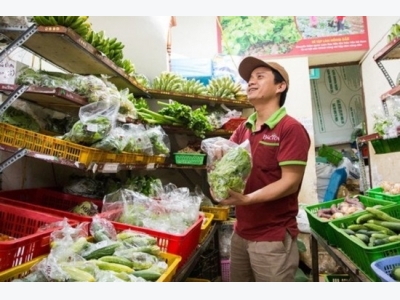Scaling up the trust networks for food safety with small farmers

The Belgium Embassy in Vietnam in cooperation with the Hanoi University of Public Health (HUP), International Livestock Research Institute in Vietnam and the Food and Agriculture Organization of the United Nations (FAO) organize a one-day workshop titled “Scaling up the trust networks for food safety with small farmers” on 4th July 2017 at the HUPH’s campus.
Food safety is currently a prime priority of the Government of Vietnam and Belgium.
The workshop was attended by representatives from research institutes and universities, representatives of the Ministry of Agriculture and Rural Development, Ministry of Health, inter-agencies in the field of food safety, national and international organizations, donors, as well as agriculture producers, retailers, consumers, and media.
The objective of the workshop is to explore available supports for safe food supply networks based on recommendations made in the World Bank report, to give out recommendations for scaling up the trust networks for food safety, and to discover the needs and opportunities for information exchange and traceability.
Food safety is currently a prime priority of the Government of Vietnam. The report "Vietnam food safety risks management: challenges and opportunities" by the World Bank and its partners aim to support and enhance the management and risk assessment capacity of food safety for the Government. According to the report, recognizing the roles and responsibilities of agents/actors in food safety networks, particularly the role of small-scale production, as well as traceability are important tasks to do in the coming time. In the spirit of this report, the Embassy of Belgium in Vietnam collaborated with the Hanoi University of Public Health, the International Livestock Research Institute (ILRI) in Vietnam, the Food and Agriculture Organization of the United Nations (FAO) to organize a workshop “Scaling up the trust networks for food safety with small farmers” on July 4th, 2017 at the Hanoi University of Public Health. According to Mr. Geert Vansintjan – Deputy Head of Mission of the Belgium, small farmer is one of the very important actors in the network for food safety. “In the developed countries, small farmers have always received attention from governments”, said Mr. Vansintjan.
The workshop will provide comprehensive and necessary information on specific identification methods for actors in the food supply chain, thereby enhancing consumers’ trust, providing some directions to build up credible relationships between actors in the supply chain. This platform creates support foundation that enables small-scale safety food chains to access the market more efficiently.
The role of related parties
Embassy of Belgium in Vietnam: Food Technology, Food safety, and food production are priority areas for the Vietnam-Belgium partnership. Belgium prides itself – like Vietnam, on its quality of food and the quality of life. Moreover, Vietnam is long-standing partners on food production and food technology: collaboration on aquaculture e.g. with the University of Can Tho, the Vietnam – Belgium Food Network – a partnership between Vietnamese and Belgian Food Technology faculties, fair trade and safe food support to small farmers with VECO. For Belgium, a partnership on food production and technology goes beyond technology as it is part of the culture and heritage.
Hanoi University of Public Health (HUPH): the first university in the country, which provides training in the field of public health. It aims to become a prestigious center for training and research in the country and in the region. The Center for Public Health and Ecosystem Research (CENPHER), established in June 2012, is a research unit of the University, focusing on interdisciplinary research. The three main development directions of the center include research, training and service delivery to promote linkages between health and environment in Vietnam and in the region. www.cenpher.huph.edu.vn/home
International Livestock Research Institute (ILRI) works to improve food security, nutrition, and poverty reduction in developing countries through research projects, which promote efficient, safe and sustainable livestock production. ILRI is one of 15 research centers of the International Agricultural Research Group (CGIAR), specializing in livestock agriculture research in developing countries. www.ilri.org.
Food and Agriculture Organization of the United Nations (FAO): FAO started working in Vietnam in 1978. Since then, FAO Viet Nam has provided technical assistance, advice to the Government, and has been involved in the implementation of some 400 projects in the areas of sustainable agricultural development, food security, and nutrition, forestry and fisheries. During the1990s, in response to the new challenges, FAO redirected its focus in Viet Nam towards offering the Government policy advice, assisting in the formulation of policies that address sustainable national food security, the improvement of agricultural support services, planning and implementation of projects targeted at the rural poor.
Related news
 Rice exports down in volume but up in value
Rice exports down in volume but up in value Vietnam’s rice exports will gradually decrease in the years to come, according to a rice export market development strategy in 2017-2020
 Vietnam to promote high quality rice to boost export revenues
Vietnam to promote high quality rice to boost export revenues Vietnam has outlined plans to boost revenues from rice exports over the next decade by focusing on a higher quality product and selling more outside Asia.
 Meat exports are still a difficult problem
Meat exports are still a difficult problem Despite being "rescued" but with a large supply, slow consumption has led hog prices in many localities in June continue to decrease.